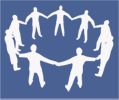Staying social can make a big difference in how you can handle things. Maintaining contact with other people, especially those you have a particular connection with can be very important. Getting out-and-about and interacting with others helps maintain social skills, keeps you mentally healthy and active. Relationships with friends and lovers provide companionship, support and someone to share life’s ups and downs with.
Although living alone can be challenging for some, others enjoy the freedom to do as they please. For those who choose not to be alone, sharing with a partner or friend can be a supportive and cost-effective option. Taking in lodgers can also be an option for those with a spare room. Advantages in both cases include shared living expenses, enlarged friendship networks and options for support and entertainment.
Enjoy your home by caring for it. Make it a refuge and an enjoyable haven. The more you care about your home, the more you will feel able to share it with others.
Family can be a difficult balancing act. The acceptance, understanding and support they can offer can often be dependent on many factors including their knowledge and understanding of HIV. Getting support, acceptance and understanding from family members can take time and effort, but might be worth it in the end.
What you can do to live well:
 |
Make an effort to keep in touch with people that make you feel good. Call a friend and invite them over for a visit. |
 |
Create a nice home Establish and tend a garden |
 |
Get a pet. |
 |
Become a volunteer in an area that interests you. Meet new people. Join a common interest group |

